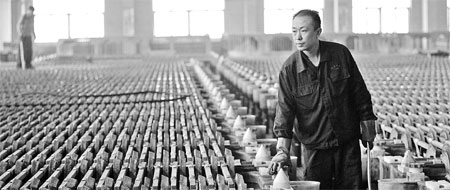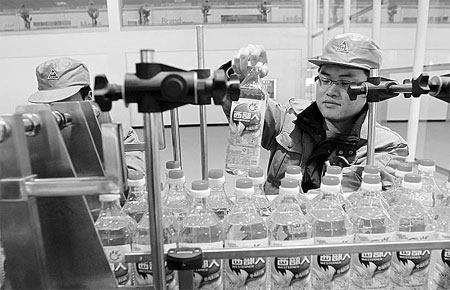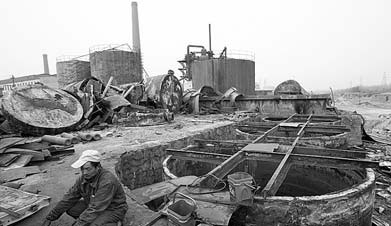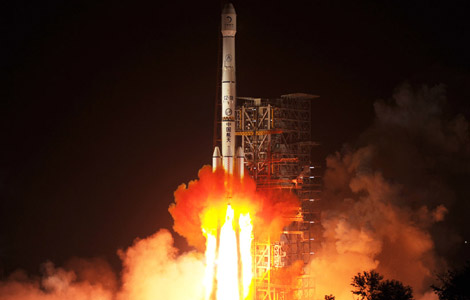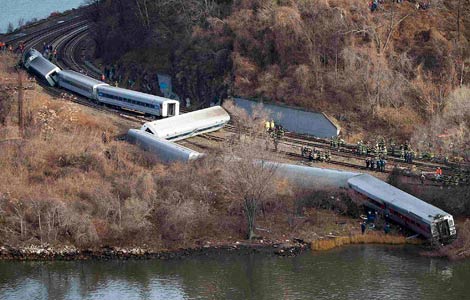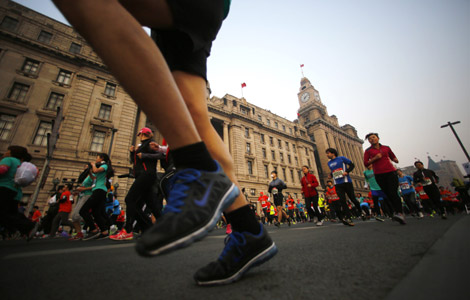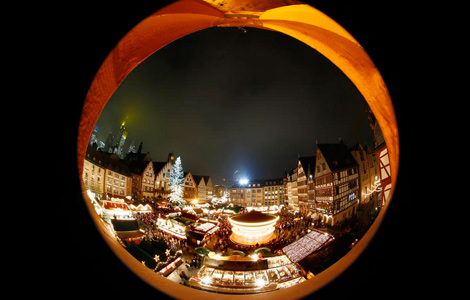Looking to clear the air
Updated: 2013-12-02 07:24
By Yang Wanli and Xue Chaohua (China Daily)
|
||||||||
Moves are underway to reduce emissions and pollutions in the heartland of China's metals and petrochemical industries, as Yang Wanli and Xue Chaohua report from Baiyin, Gansu province,
If you mention air pollution in Baiyin, the locals are always happy to relate a famous local story. In the 1990s, a man spent his entire month's salary on a Phoenix bike, one of the most popular brands in China at the time. After riding his new pride and joy to work, the man locked his bike and left it outside the factory. A little later, a rainstorm hit the area. At the end of his shift, when the man went to fetch his new bike, he was unable to find it because the high acid content in the rain had dissolved the paint on the frame, leaving his new bike looking as pitted and worn as all the others in the rack.
"It's a true story. From the 1960s until the early part of this century, the entire city was shrouded in a choking acid mist. People even stopped smoking, not because of health concerns, but because the acid in the air made the cigarettes taste too sweet," said Zhao Zhanjiang, 67, who worked for Baiyin Nonferrous Metals Co from 1971 until he retired in 1998.
Things have yet to improve significantly. This year, Baiyin was listed as one of the five worst cities in Gansu province for air quality and the other four - the provincial capital of Lanzhou, plus Jinchang, Jiayuguan and Tianshui - were all firmly rooted at the lower end of a nationwide list of 74 surveyed by the Ministry of Environmental Protection.
Particle pollution, also called particulate matter or PM, is the term used for a mixture of solid particles and droplets of liquid found in the air. Particle pollution includes "inhalable coarse particles," those larger than 2.5 micrometers - known as PM 2.5 - and smaller than 10 micrometers, known as PM 10.
In 2011, the World Health Organization reported that Lanzhou had the worst air quality among 11 cities in western China. The city's PM 10 reading of 121 meant the air quality was even worse than in Beijing.
The residents of Baiyin are no strangers to poor air quality. Records collated by the Baiyin Environment Protection Bureau show that in 2004, the city experienced just 152 "blue-sky" days, the lowest number in the city's history. In Lanzhou, the record of 235 days was set in 2009, making it the worst offender among the 74 major cities under ministry supervision.
However, things began to change in 2012 when Lanzhou failed to appear in a list released by the ministry that showed the 10 cities with the worst air quality. In a surprise about-face, in September Lanzhou was ranked sixth out of the top 10 cities with the best air quality. Lanzhou and Lhasa, the capital of the Tibet autonomous region, were the only inland cities on the list, the other eight were all situated in coastal areas. In October, Lanzhou's air quality was ranked 23rd nationwide, the best placing of any city in the northwest.
A lethal combination
A combination of local geography, atmospheric conditions and the province's industrial structure have contributed to the poor air quality, said Sun Yulong-deputy director of the Gansu Environment Protection Department. For example, Lanzhou is situated in a valley of the Yellow River, which restricts the circulation of the air.
Lanzhou is home to a large number of factories, including many involved in petroleum processing, and is frequently hit by dust storms, especially in winter and spring. Gansu saw 44 sand storms last year. The highest concentration of inhalable particles was 8.4 mg per cubic meter, 55 times higher than the national limit for level-two air quality.
"There are many reasons for the air pollution in the five Gansu cities the government has been monitoring, but heavy industry must shoulder most of the blame," Sun said. "Sand storms are seasonal, but factories produce emissions every day. "
By the end of 2012, the number of vehicles on Lanzhou's roads had topped 500,000 and harmful emissions were generated every day in winter by 800 large and 200 small coal-burning boilers. Nearly 80 percent of the factories surrounding the city center were related to petrochemicals and non-ferrous metals.
The metals industry has had a huge effect on the air quality in Baiyin. In the past half-century, the refining of copper and other metals has become a pillar industry in the city. The metals industry contributed greatly to the national economy in the first few decades after the foundation of the People's Republic, but the resultant pollution has created a harsh environment for local residents.
"We never opened the windows of our house. In the copper workshops, workers couldn't wear cotton underwear because it would be eaten away within a few days. Even a kilometer or so away from the factory, there was a strong smell and fumes that irritated the eyes," said Zhao.
Burning rain
Despite the health risks, the high level of pay in the metals industry made it an attractive proposition. During the 1980s and '90s, the average monthly salary of between 80 ($13) and 150 yuan was as much as five times higher than that of a local public servant.
Wang Xiuying, 74, who also worked for a copper company in Baiyin, said new workers from other provinces were even allowed to stay in the city's best hotel during the first few weeks of their transition period. "To work for a metals company was really something to be proud of," she said.
At the time, the amenities in villages were primitive. Few of the rural workers who arrived in Baiyin had used a shower before the age of 16 when they started work, but they soon discovered that the water in the shower rooms at the factories ran all day.
Daily ablutions were a mandatory post-work process, because the acid used during production evaporated and turned into acid mist. It ate away people's clothes and mixed with their sweat, causing severe discomfort and blisters. "On rainy days, even small drops of rain would leave a white stain on your clothes. Sometimes, the raindrops even burned a small hole," said Wang.
She said life in the electrolysis workshop was physically exhausting and risky in terms of health. The workers were supposed to wear masks, but "Most didn't because the temperature in the workshop was too high."
The late 1990s saw changes to China's economic growth model as heavy industry made way for the new energy sector. As the city's largest metals company, Baiyin Nonferrous Metals once employed one out of every 10 residents, but business fell off after 2000.
"My salary was 1,000 yuan in 2002, just half the average monthly income in Baiyin," said Xi Jiang, 42, who works for Baiyin Nonferrous Metals. The low wages and health risks affected the workers socially too. "Ads in the lonely hearts column of the local paper almost always ended with a variation on 'Thanks, but no thanks if you work for Baiyin Nonferrous Metals,'" said Xi.
The outdated production facilities also caused severe environmental problems. On Dec 19, 2002, the concentration of sulfur dioxide in Baiyin's air was measured at 7.6 mg per cubic meter, far outstripping the legal limit of 0.5 mg.
"That was the highest concentration I've experienced in my entire career. It was incredibly high and would definitely damage the respiratory system. The poor air quality could be life threatening, especially for those with asthma," said Chai Fahe, vice-president of the Chinese Research Academy of Environmental Sciences.
The twin pressures of falling profits and air pollution forced the company to change. By the end of 2008, it had invested around 9 billion yuan to update the facilities and build a recycling system. From 2007 to 2012, sulfur dioxide emissions were reduced by approximately 70,000 tons, accounting for 80 percent of the provincial reduction.
Tough measures
On the roads into Baiyin's downtown area, countless small and medium-sized abandoned factories, all with their distinctive high chimneys, stand shoulder to shoulder, covered by thick dust. In winter, the leafless trees and grassless soil give the impression that the outskirts have been painted gray.
In a small, abandoned factory near the city center, four workers were using a plastic drum to remove acid from a large cement pool. They were reluctant to give their names, but said the factory, built 40 years ago, closed in 2012. Most of the facilities are in a state of advanced disrepair. The containers are stained light and dark yellow, indicating that the acid they contain has been leaking for some time.
The factory was one of more than 50 the city government forced to close last year. Early this year, the provincial government approved a budget of 150 million yuan to treat emissions. All the local highly polluting factories were given a stark choice - they could either close or they could improve their waste-recycling systems and update the old facilities to make them environmentally friendly.
In Lanzhou, 5 billion yuan was invested to tackle pollution from 2006 to 2010. A new gas heating system reduced the annual consumption of coal by 650,000 metric tons, almost entirely eradicating the use of the fuel in the downtown area. The airborne concentration of sulfur dioxide was reduced by 20 percent, as was the concentration of inhalable particulate matter. Nearly 70 small and medium-sized factories will be relocated to the suburbs by the end of this year and 13 other highly polluting factories will be closed. Within a year, coal-fired heating will be totally eradicated from the city center.
To meet national environmental protection standards, the provincial authorities have rebuilt or upgraded the facilities at 135 factories. Statistics from Gansu Environment Protection Department show that in 2012 sulfur dioxide emissions fell by 56,2000 tons and nitrogen oxide by 23,600 tons. The effect has been an increase in the number of blue-sky days. Compared with 2011, the five Gansu cities under special supervision recorded a higher number of days with good air quality in 2012. Baiyin registered 41 extra blue-sky days, while Jiayuguan saw an extra 86.
The moves to improve the quality of the air are having a positive effect and the locals realize the process will be long and arduous, but ultimately worthwhile.
"There used to be a saying: 'If you stay in Baiyin for three years, your teeth will no longer be strong enough to eat beans," said the former metals worker Zhao, "I really hope that saying will be thrown into the dustbin of history before I die."
Contact the writer at yangwanli@chinadaily.com.cn
|
A worker surveys blocks of copper at the factory of Baiyin Nonferrous Metals Co in Baiyin, Gansu province. Photos by Zhang Wei / China Daily |
|
Out with the old, in with the new. Members of staff bottle sunflower oil at Gansu Jingye Agriculture Science Technology Co in Lanzhou, the capital of Gansu province. |
|
One of the few workers left at at a decommissioned chemical plant close to the center of Baiyin. |
(China Daily 12/02/2013 page4)
Most Viewed
Editor's Picks

|

|

|

|

|

|
Today's Top News
Washington's panda named Bao Bao
At least 4 dead in NYC commuter train derailment
China's new billionaires may have a lot to learn
China launches moon rover
Internships in DC payoff for Asian youth
Japan ignores Cairo Declaration
Cameron in China to forge ties
Candid exchange key to Biden's visit
US Weekly

|

|
